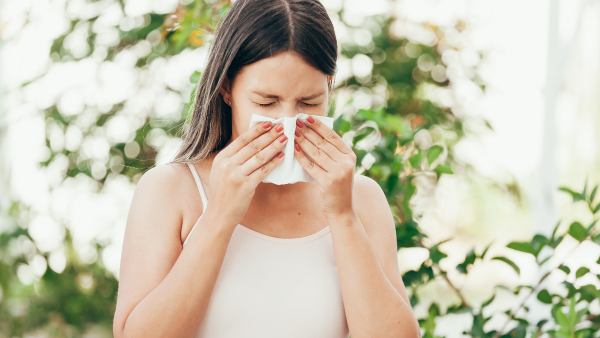Allergies have many faces: the most common symptoms include a runny nose, watery eyes, cough, difficulty breathing, reddened and itchy skin, gastrointestinal problems, diarrhea and vomiting.
The most common allergies include pollen, animal hair and food allergies.
In an allergy, the immune system reacts to the allergen by releasing histamine. Histamine is responsible for many unpleasant symptoms.
Allergies are not harmless. In the worst case, they can cause anaphylactic shock. Blood pressure drops so much that fainting can occur.
Allergies also increase the risk of asthma. People with allergic rhinitis are three times more likely to develop asthma than people without allergies.

If you have an allergy, it is first important to find out what exactly you are allergic to. The best strategy is usually to avoid the allergen. If this is not possible, antihistamines are often used to relieve the symptoms.
In cases of severe allergies, cortisone is also used, which inhibits inflammation and thus alleviates allergy symptoms.
Another treatment strategy is desensitization. This approach involves injecting the allergens at regular intervals. This is intended to get the immune system used to the allergens, which means that it no longer overreacts.
Micronutrients can also support the treatment of allergies.
Quercetin
Quercetin is a secondary plant substance and belongs to the group of polyphenols. Polyphenols have antioxidant properties and can counteract inflammation. [1]
Studies suggest that quercetin may relieve symptoms of allergic rhinitis. This is thought to occur by inhibiting the histamine H1 receptor (HR1), thereby reducing the release of histamine. [2]
MSM
Methylsulfonylmethane (MSM) is organic sulfur. Sulfur has many important functions in the body. It is a component of proteins, enzymes and hormones and is involved in detoxification.
In studies, MSM appeared to be able to alleviate the symptoms of pollen allergies. [3] , [4] , [5]
The mechanism is not understood in detail, but scientists assume that MSM could have a regulatory effect on allergies and thus mitigate the allergic reaction of the immune system.
Vitamin C
Vitamin C helps protect cells from oxidative stress. There is also evidence that vitamin C may inhibit the release of histamine. For this reason, vitamin C is promising for allergies.
In one study, vitamin C appeared to improve lung function in allergic rhinitis. [6]
zinc
Zinc helps protect cells from oxidative stress. [7] This may help counteract the antioxidant stress associated with allergies.
copper
Copper also helps protect cells from oxidative stress. [8] It is also thought that it could accelerate the breakdown of histamine.
manganese
Manganese is often a component of allergy nasal sprays. The mineral is said to have anti-allergic properties and can prevent itching and skin redness. This is probably due to the fact that manganese helps protect cells from oxidative stress. [9]

Conclusion: Antioxidants have great potential for allergies
Antioxidants can help counteract the oxidative stress associated with allergies. Some nutrients, such as vitamin C and copper, appear to influence the release and breakdown of histamine. People suffering from allergies should ensure they have a good supply of these nutrients.
The Allergy Complex from Viktilabs (AllergiCare® Daily) contains quercetin, MSM, vitamin C, zinc, copper and manganese. It is developed in Germany according to the highest quality standards and is free from unnecessary additives such as colorants, sweeteners, binding agents and separating agents.
[1] https://www.ncbi.nlm.nih.gov/pmc/articles/PMC3685779/
[2] https://pubmed.ncbi.nlm.nih.gov/23333628/
[3] https://www.ncbi.nlm.nih.gov/pmc/articles/PMC6293242/
[4] https://pubmed.ncbi.nlm.nih.gov/12006124/
[5] https://pubmed.ncbi.nlm.nih.gov/12676029/
[6] https://pubmed.ncbi.nlm.nih.gov/2221490/
[7] https://pubmed.ncbi.nlm.nih.gov/28353636/

















